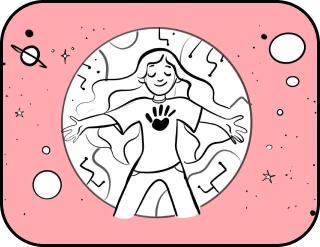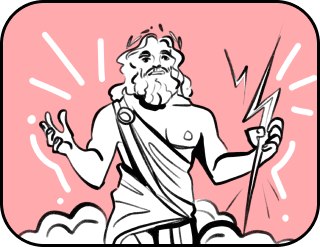Ode to DeFi: understanding the future of banking
Disclaimer. The editors of The Global Technology magazine insist that this article is written exclusively about the meeting of four friends and decentralized finance. All the names in the story are just inscriptions on cards.
‘Gentlemen, write, write!’ a man in a business suit commanded and looked around at everyone sitting at the round table.
Those were his acquaintances from the party, who, in the midst of it, decided to go down to the cellar of the country house to play the famous game “Guess who you are.” The Keller was virtually unlit, and the shelves stacked with elite alcohol, a folded ping-pong table against the wall and a portrait of Benjamin Franklin on the floor gave it a special chill-out atmosphere of the best underground bars in London.
A man in a business suit adjusted the gold watch on his hand, on which the light from a single lamp fell, and sat down at the round table.
‘The idea of the game is to write the names of famous characters or well-known concepts on cards. You can even write a fictional character, it doesn’t matter. I don’t know…. write Naruto or Niagara Falls, but don’t write your cousin’s name,’ he said, handing out playing cards to those sitting at the table. ‘Write and place the card face down, then move it to the person sitting on your right, and the person sitting on your left moves the card towards you. You take a card from the table without looking at it, lick the reverse side and stick it to your forehead. Like this,’ he began to diligently lick his card. ‘Then we take turns asking questions about our character or word, and after 10 questions everyone must give an answer.’
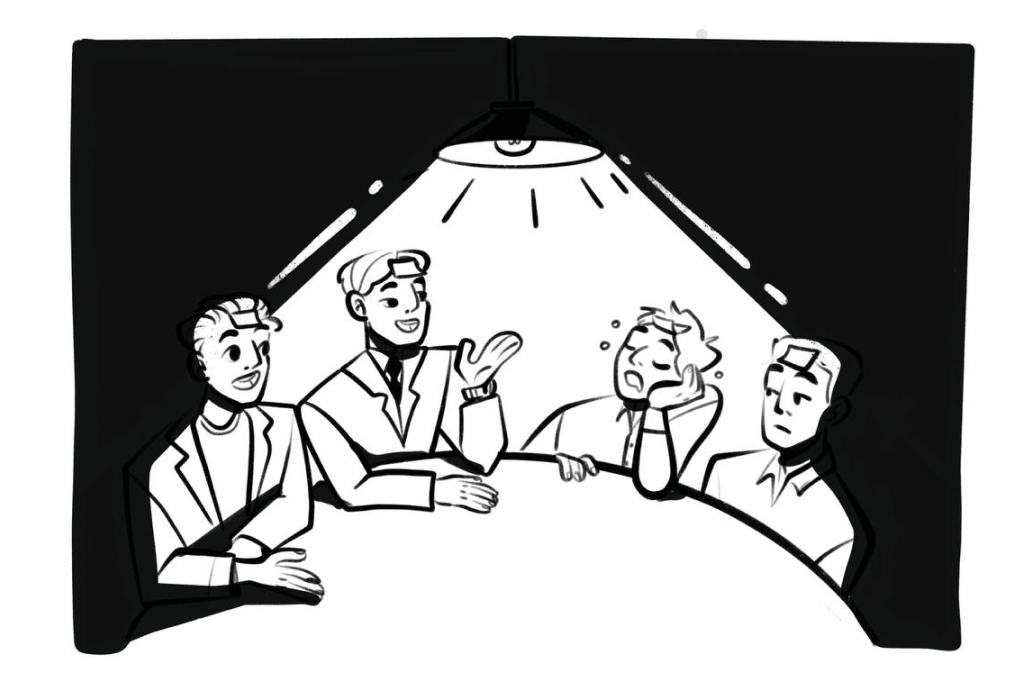
Everyone sitting at the table began to write something on their cards and pass them to each other. When the creaking of the markers stopped, the man in the business suit broke the silence:
‘So, I guess I’ll start in order to remind you of the essence of the game. I’m an inanimate object, I’m not a person and I can’t talk, is it right?’
Everyone sitting at the table shook their heads negatively, to which the young man in the business suit snapped his fingers and then patted his neighbor on the shoulder on the left. His neighbor, a young man of about 25, after several glasses of strong Irish whiskey, kept trying to fall asleep, but after an active pat on the shoulder, he briefly came to his senses and put forward his version:
‘I’m most likely a person, one of those,’ he closed his eyes again, remembering the word. ‘One of those… white collar workers.’
‘Yes and no,’ another young man, who was older, answered him. He didn’t like everything that was happening, because he was an ordinary civil servant, and the party was clearly dragging on. ‘You need to formulate questions more clearly! So…’ he knocked on the table. ‘Am I an object that everyone needs?’
Everyone sitting at the table nodded approvingly, and the young man, who had had too much alcohol, even began to whistle.
‘Great!’ the young man almost shouted. ‘Then the next question will also be mine! Do I have anything to do with finance?’
‘A lot,’ the neighbor on the right answered him with a smile. That young man had a card with the name “Vitalik Buterin” on his forehead.
‘A lot … and everyone needs me…’ the civil servant said thoughtfully. ‘I’m either a dollar or a bank!’
The civil servant slammed the table, and without waiting for comments from the other participants in the game, he removed his card from his forehead. There really was the inscription “Bank” on it.

Everyone sitting at the table made a disapproving noise; no one wanted the game to end before it began, except for the tipsy young man, who began to doze off again.
The civil servant felt guilty and, in order to somehow defuse the situation, said the first thing that came to his mind:
‘Well, a bank, just a bank. By the way, I have always believed that a bank is a clear and well-functioning system. It turns out that this system still uses technologies from the 70s of the last century to process all transactions. Such as the Society for Worldwide Interbank Financial Telecommunications, better known and similar to SWIFT. We’re just stuck in the last century with these banks,’ he said doomedly, counting on the approval of his fellow players. ‘Good deal!’
‘Good deal!’ the young man in a business suit said, copying the intonation of the civil servant. What he didn’t like most was that the game ended so quickly and he had to return to the noisy party again. ‘Remember any of the financial turmoil. Banks first earn excess profits, and then are saved at the expense of taxpayers. It turns out that the state prints money as a monopoly, but the bank stores and uses it.’
The civil servant instantly realized that he had managed to divert attention from the game towards a discussion of the financial system, so he continued with fervor:
‘Why is it still so difficult and confusing to send money or borrow money in the digital world?’
‘Well… the bank essentially doesn’t owe you anything, it’s just an intermediary between those who have excess capital and those who need capital. With the same success, some use exchanges, others brokers… In fact, any cafe is also an intermediary between you and a cup of coffee: you can get a cup of coffee in any cafe, the only question is how quickly and how tasty it will be,’ the young man with the “Vitaly Buterin” card objected to the civil servant.
Everyone sitting at the table turned in his direction.
‘It’s funny to hear this from you,’ the young man in a business suit said with a smile. ‘Because we can clearly see what’s written on your card.’
‘Oh, so our game continues?’ the young man answered him joyfully. ‘I also have some to do with finance, don’t I?’
‘You’re right! The game continues,’ the young man in a business suit nodded approvingly, and then turned towards the civil servant. ‘Why, exactly, do the banks not please you? There is nothing wrong with money or banks. Thanks to the emergence of such a link as the bank, people who dream of buying houses or cars, paying school fees for their children, companies that need capital to expand their business, countries that want to build new roads, schools or hospitals, can receive the necessary funds.’
‘A connecting link?..’ repeated the young man with the sign “Vitaly Buterin” and looked at the dull ceiling. ‘A connecting link…’
Everyone sitting at the table turned in his direction again, and the dozing young man, having read the young man’s card, mumbled in a slurred tongue:
‘Oh… who is saying this…’ and fell back into sleep.
The civil servant, who dreamed of leaving the event as quickly as possible, and also dreamed of quickly ending the conversation about the pros and cons of the banking system, stood up and began to walk from side to side.
‘People who want to receive funds from a bank for some of their needs, let’s call them Scarcity Subjects, can indeed take out loans directly from banks. Or, in general, they can issue debt or equity securities and thus obtain the necessary funds. But no one will give you these loans and excess investor funds so easily! Due to the presence of this very “connecting link”,’ he said categorically and leaned on the table with both hands. ‘Here we go!’
‘The connecting link again…’ muttered the young man, who still hadn’t guessed his card.
‘Yes, the link again,’ the civil servant said, practically overturning the table.
‘That’s the link, Brother. Which decides how to apply security rules, which clients to agree with, who to refuse a transaction, and much more. Yes, if any bank decides to close your account allegedly because of a suspicious transaction, you will find out about it after the fact and won’t even understand what’s going on! The bank creates rules, changes them, interprets them in its favor, and so on. And then it will print a ton of money in order to worsen global inflation. Unless you,’ he pointed his finger at a young man in a business suit, ‘could give us at least some choice.’
The civil servant stopped short, he realized that he had given the young man in a business suit a comprehensive hint, but there was nowhere to retreat.
The young man in a business suit perked up, smoothed his perfectly styled hair with his hand and said in surprise:
‘Me? Does my card say “Satoshi Nakamoto”?’
The young man tore the card from his forehead and turned it over. It actually had “Satoshi Nakamoto” written on it.
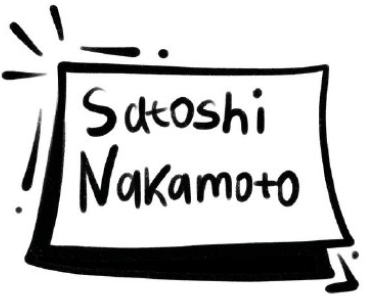
‘Wow,’ he said in surprise. ‘But whoever wrote this doesn’t know that such a character as Satoshi Nakamoto does not exist, but knows very well that a group of people hiding behind this pseudonym offered the world an alternative currency – Bitcoin. Moreover, the creators of Bitcoin laid down a rule according to which only 21 million coins will be mined. Thanks to this rule, Bitcoin, unlike regular money, does not depreciate, which is why it is considered digital gold. And it does not belong to the banks, but directly to its owner.’
‘That’s how it is,’ the civil servant said conciliatorily. ‘It seems that on the one hand it has become easier, because with the advent of Bitcoin such a connecting link as a bank disappeared.’
He wanted to continue, but his remark was interrupted by the young man who had woken up again. In a slurred voice, he asked the civil servant:
‘How can a bank fall away… I saw the bank today and yesterday I kept money there and today… and which bank has exactly fallen, huh?’
The civil servant looked at the young man in such a way that he involuntarily began to slide out of his chair.
‘The bank hasn’t fallen, there is no longer a need for it!’ he continued in the voice of a school teacher. ‘And the need has gone because the creators of Bitcoin used another revolutionary technology – blockchain. This blockchain, such a scoundrel, makes it so that the list of all account transactions is stored by each participant in encrypted form, and is not in the hands of one monopolist! It acts as such a ledger with shared access. It means, centralized ownership of currency has been replaced by a decentralized system! Decentralization!’
The civil servant looked at his friend, who had had too much alcohol, and saw that he had again flown off to the kingdom of Morpheus.
‘Well, who am I telling this to?’ he asked displeasedly over the ear of his sleeping fellow.
‘The game continues,’ his friend muttered in an indistinct voice and fell asleep again.
‘The game continues,’ the young man in a business suit emphasized with a grin. ‘When the world more or less mastered blockchain technology, cryptocurrencies began to appear in incredible quantities. Remember the story of Squid Game, which you could buy, but could not sell. The bubble began to inflate and along with that, what?’
‘What?’ the young man with the card “Vitaly Buterin” asked almost in a whisper.
‘You should know,’ the young man in a business suit grinned. ‘At the same time, crypto exchanges began to grow exponentially. How, I ask you, in the cryptocurrency world, which is built on anonymity, security and decentralization, a powerful centralizer appeared that collects personal data and stores our money in accounts?’
The young man spread his arms, as if he was addressing an invisible interlocutor at that moment. The civil servant also spread his arms as if he saw that invisible interlocutor.
The visible interlocutor in the form of a fairly drunk young man raised his head again.
‘Some kind of bubble… Banks exist… they charge interest… and use,’ he took a deep breath into his lungs, ‘customers’ money……You’re talking nonsense… Blockchain will change the world.. and scammers….? The game continues…..’
All those present listened to this short speech and looked at their fellow with pity.
‘I realized who I am,’ finally said the young man who had Vitalik Buterin written on his card. ‘You were so diligent in telling me, and I was thinking about something of my own.’
He peeled off his card and saw the inscription.
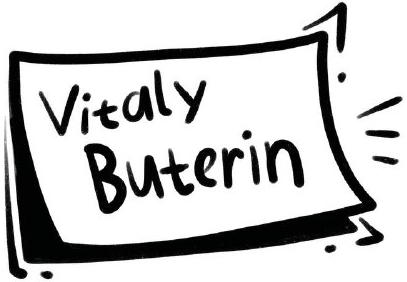
‘It turns out that I… that is, the character who is indicated on my card, really changed the situation. Vitalik really managed to remove the “connecting link” in the form of banks and create a completely different system, which itself checks the terms of the agreement and transfers money from one account to another,’ the young man turned his card over in his hands. ‘If I’m not mistaken, then I wrote one very powerful smart contract, algorithm, or, if you like, a “bot” that can perform some part of the tasks. They are open, everyone can read them, and through this trust is built. To release a smart contract, you usually need to call auditors, they will confirm that it works as described, and only after that it is put into operation.’
‘You are not mistaken,’ the young man in a business suit supported the young man. ‘A unique alternative to banks has appeared. Conventionally, we pay the smart contract, and it then manages our money and issues liquidity back if we ask for it.’
‘Yes….’ the young man again began to look at his card and thought that a couple of hours ago he was just a guest at the party, and now he briefly tried on the role of a great man.
We don’t know what the civil servant was thinking about at that moment, but apparently he did not share everyone’s joy.
‘Here’s the mistake of your whole new system!’ he said, looking into the eyes of each interlocutor. ‘A lawyer is responsible for drawing up a regular contract, with whom you can meet and evaluate the degree of his literacy, and who comes up with all these newfangled and incomprehensible algorithms?’
‘To draw up an agreement, in the real world we turn to lawyers,’ the young man in a business suit answered calmly. ‘It’s logical to assume that in order to get a smart contract, you should go to the developers. They will write it with a guarantee that it will be good, then they will give it to auditors, then they will show it to the community, and only then will they release it. If you need to change something or make an update, the path is the same. They will tell the community, show the code changes, show the auditors’ conclusions, wait until everyone discusses everything, then release it. There is no problem here.’
And the young man spread his hands again.
‘There is a problem,’ answered the young man calmly, who played the role of Vitalik Buterin that evening. ‘I’ll explain.’
He pulled the cards of all the participants towards him and began to lay them out on the table.
‘The basis of decentralized finance is smart contracts with strategies for what to buy, how to buy and when to buy. Choosing a strategy now is like choosing a bank deposit without knowing the market. You have to physically go to 10 banks, open an account in each, go through all the checks, compliance, show your passport, give consent to the processing of personal data and take many more necessary and unnecessary steps. After that, they will tell you what interest rate you will have on your deposit and other conditions. The same thing here, in the new system. If we excluded the bank and installed a smart contract instead, it would be nice to learn how to distinguish working protocols from outright fraudulent ones. The information is there, it is all open and lies in on-chain data, but it needs to be read, marked and processed.’
The civil servant and the young man in a business suit carefully watched the movements of the young man’s hands and continued to listen to him carefully.
‘For now, in order for each of us to switch to a decentralized system and abandon all these banks, we need to create 3-4-5 different crypto-wallets, figure out what exactly to do, make a lot of calculations, exchanges, confirmations and everything else… Yes, anyone here will be indignant and will say: “Well, instead of 20 incomprehensible clicks, I’d rather pay in cash.” I think that the developers of decentralized systems are well aware that what is currently missing is an abstraction of accounts – a smart contract that allows you to program various functions for the user, so that the default system is not so scary for everyone. After all, the game continues!’
The young man smiled and put all the cards in his hands together.
‘We’ve forgotten our main player,’ the civil servant realized.
He moved closer to his drunk neighbor and took the card off his forehead.
‘What is written on it?’ asked the young man in a business suit.
‘State,’ the young man read slowly, putting the “Vitalik Buterin” card into his pocket.
‘State,’ the civil servant repeated thoughtfully.
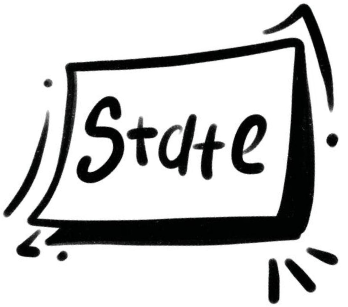
The young people spent some more time at the round table, discussing the perfection and imperfection of the banking system, altcoins, financial bubbles and the capital that came from nowhere to their common school friend. After that, they helped their drunk friend get up and left the room with him.
The game continues.
According to the Big Bang Theory, the Great Explosion of discoveries starts right now.
Thank you!


